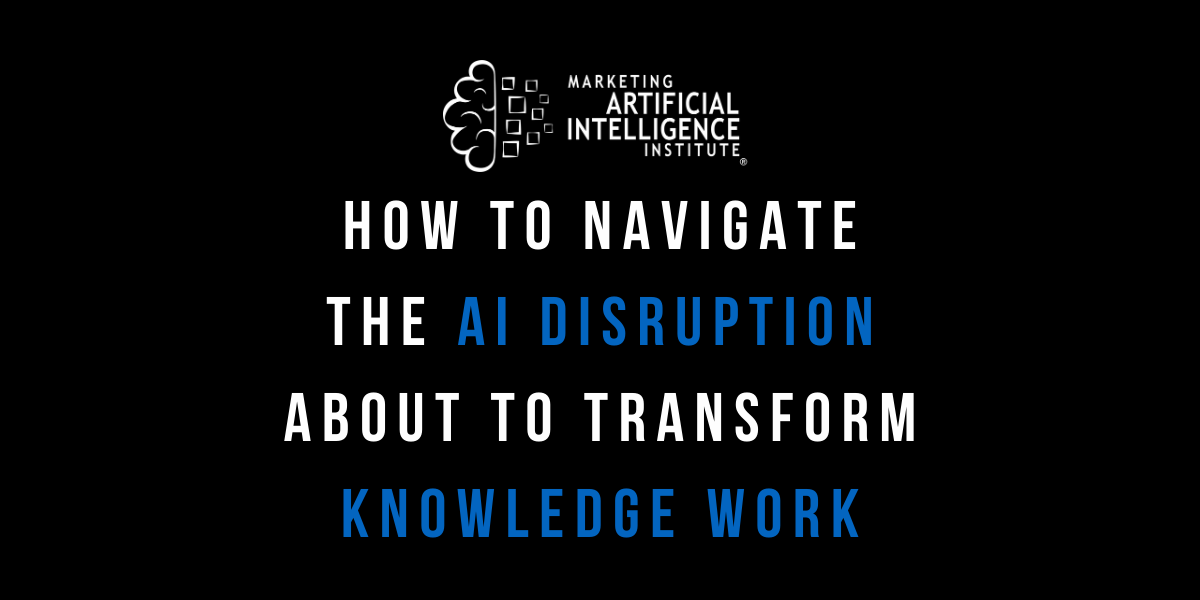AI is about to change knowledge work forever. And we're seeing signals that it's happening faster than you might expect.
One example from this week:
AI expert Ethan Mollick shared his early experiments with Google's Gemini 1.5. This version of Gemini can handle a stunning 1 million tokens, or 750,000 words of information.
Mollick said:
“I fed it all my published academic work prior to 2022 — over 1,000 pages of PDFs spread across 20 papers and books — and Gemini was able to summarize the themes in my work and quote accurately from among the papers. There were no major hallucinations, only minor errors where it attributed a correct quote to the wrong PDF file, or mixed up the order of two phrases in a document. You can see how the advent of massive context windows gives AI superhuman recall and new use cases.”
In another example:
Marketing AI Institute founder/CEO Paul Roetzer saved 42 hours of his time on critical marketing tasks using just basic AI.
We're seeing breathtaking AI capabilities in knowledge work develop rapidly. And this is going to have a huge effect on how we do our jobs and run our companies.
What should we do about it? How do we plan ahead for super-powerful AI?
I got the answers from Paul on Episode 85 of The Artificial Intelligence Show.
Keep a close eye on Gemini 1.5 from Google
First, keep an eye on Gemini 1.5, says Roetzer. People he follows and trusts in AI who have early access have been blown away by this new model.
It's just one more reason why it's never been more important to start trying to infuse AI into everything you do. We’re quickly racing towards new models that make previously unimaginable outcomes possible.
How to save 42 hours with AI
In Paul's case, he used AI to tackle an event planning task list for our annual Marketing AI Conference (MAICON).
He went into ChatGPT and gave it the role of an event planner, then asked it to build a list of activities involved in creating the event agenda.
Paul asked for this in a CSV format. He downloaded it and added a couple of columns to estimate the time it takes to do each task. Then he estimated how he would use AI tools to do them and how much time he would save doing so.
There were 16 tasks related to speaker identification and recruitment. It was about 220 hours of work manually in his estimate.
"So I went through and found that out of the 16 tasks, 9 of them I could infuse AI in some way—and those 9 tasks would save me 42 hours," he says.
(Or 19% of the total.)
It’s time to do “AI impact assessments"
These are just two examples of the massive potential time savings and business transformation that can be achieved with the AI we have available today.
Because of that, Roetzer recommends every single knowledge worker do “AI impact assessments” on the work they do regularly.
That means looking at your everyday tasks and responsibilities, then identifying which ones would benefit most from AI assistance.
"If you want to find ways to apply AI, think about the projects, the tasks, the campaigns that you're already doing. And just do something like I did, where you go through and say, ‘Okay, which tools could I use at a task level?’"
He estimates doing this alone can save you 20-40% of the time you spend on some tasks.
Another way to do this is going through your job description and focusing on those activities.
"Take the campaigns you run, the projects you're doing, and find ways to infuse AI into them."
Mike Kaput
Mike Kaput is the Chief Content Officer at SmarterX and a leading voice on the application of AI in business. He is the co-author of Marketing Artificial Intelligence and co-host of The Artificial Intelligence Show podcast.


